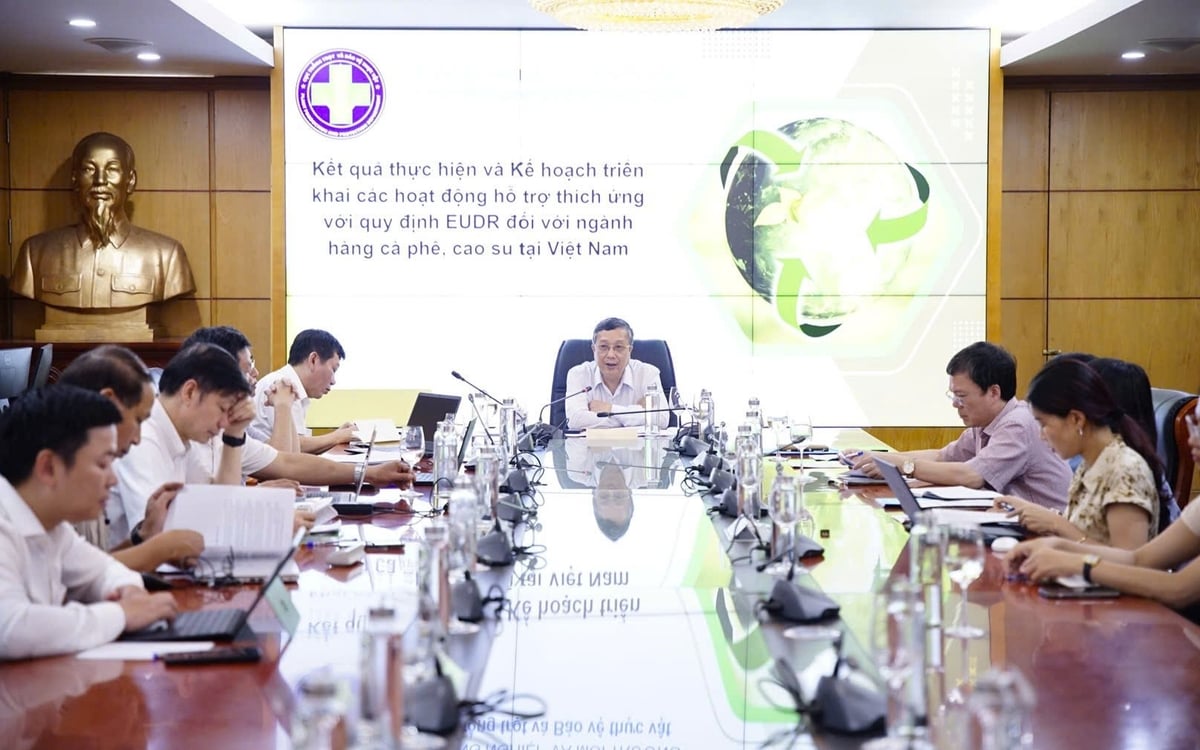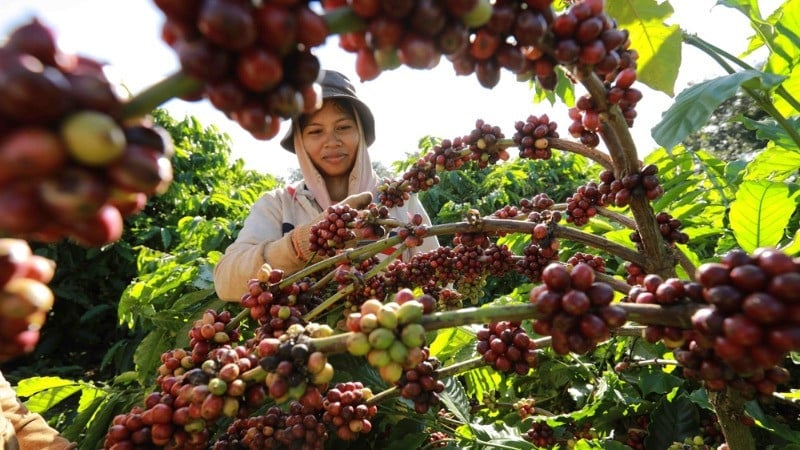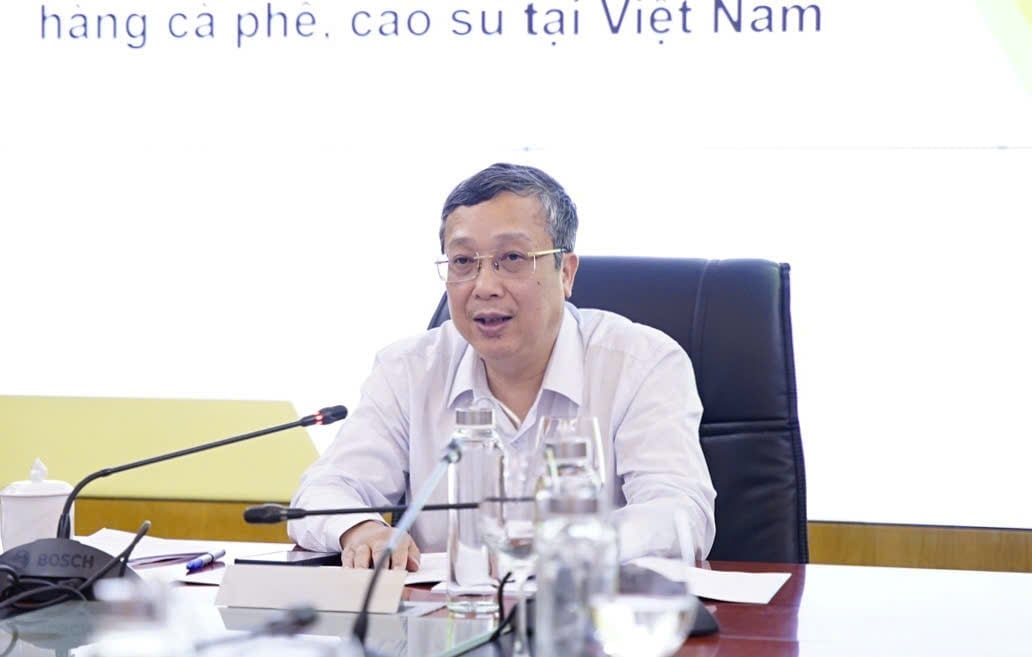December 30, 2025 | 14:54 GMT +7
December 30, 2025 | 14:54 GMT +7
Hotline: 0913.378.918
December 30, 2025 | 14:54 GMT +7
Hotline: 0913.378.918
At a meeting on June 25, chaired by Deputy Minister of Agriculture and Environment Hoang Trung and focused on implementing the EUDR and support plans for Vietnam’s coffee and rubber sectors, regulatory agencies affirmed that exports to the EU remain stable. Nevertheless, they also underscored the necessity of completing the data system for traceability declarations under EUDR to prevent disruptions.
Tran Quang Bao, Director General of the Department of Forestry and Forest Protection, reaffirmed Vietnam's dedication to adhering to EUDR and its proactive approach to deforestation-free supply chains. He emphasized the Voluntary Partnership Agreement (VPA/FLEGT) with the EU as a fundamental component of Vietnam's legal timber assurance. Moreover, Vietnam has been designated as a "low-risk" country for deforestation due to the government's strict regulation of land-use changes related to forestry.
Tran Quang Bao, however, emphasized that traceability still necessitates rigorous and comprehensive data. He compared the situation to the EU's "yellow card" warning in the fisheries sector, in which even minor errors could result in warnings, despite the overall high level of compliance.
The agencies involved have identified the completion of an integrated data system that facilitates EUDR compliance as the primary objective by the end of the year. This system will serve as a national information infrastructure with three fundamental components: a polygon-based product traceability system, cultivation area data, and the forest database (EUDR). It exceeds conventional product traceability.

Deputy Minister of Agriculture and Environment Hoang Trung chaired a meeting on the implementation results and plans for supporting activities to adapt to EUDR regulations for the coffee and rubber industries in Vietnam. Photo: Linh Linh.
As of December 31, 2020, and at the point of verification, the forest database will establish forest boundaries. Farm locations, households, yields, and crop varieties will comprise cultivation data. The traceability system will establish a connection between farmers, collecting agents, and exporters, resulting in the generation of reports that comply with EU standards.
IDH (The Sustainable Trade Initiative) is presently funding a pilot implementation for 137,000 hectares of coffee in the Central Highlands, with plans to expand to 462,000 hectares, accounting for approximately 80% of the core coffee-growing region.
Dang Duy Hien, the Deputy Director of the Centre for Digital Transformation and Agricultural Statistics, stated that the Ministry's Digital Transformation Department will oversee the system, guaranteeing data security, legal compliance, and appropriate access control for enterprises. A dedicated team will be necessary to continually update, manage, and coordinate with data sources such as local authorities, land management, and remote sensing units in order to maintain the system.

IDH is currently the sponsor of the pilot implementation of the system on an area of 137,000 hectares of coffee in the Central Highlands. Photo: VNA.
The General Director of International Cooperation Department, Nguyen Do Anh Tuan, underscored the importance of exhaustive data and the capacity to share it in accordance with EU requirements as the foundation of EUDR implementation. He clarified that Vietnam's "low-risk" status necessitates inspection of only 1% of export checks, as opposed to 3% for "medium-risk" and 9% for "high-risk" countries. Nevertheless, the sufficiency of "ground-level" data—from households, farms, and traders—to facilitate traceability filings is contingent upon this preferential rate.
Tuan emphasized that EUDR-related data should not only be functional for business use but also serve state management. Data management must strike a balance between security and transparency. He suggested collaborating directly with provincial authorities following the forthcoming administrative mergers in July to guarantee seamless national-to-local coordination.
Deputy Minister Hoang Trung commended the agencies' endeavors to adjust to the new EU regulations in his concluding remarks. "Time is short from now until early 2026. We must move from pilot implementation to full execution. Exports of our three key sectors—coffee, rubber, and wood—must proceed without interruption,” he stated.
He identified five critical objectives for the remainder of 2025, including:
Finalize the data and software infrastructure, which includes farm and trader identities, production volumes, coordinates, and maps, to ensure end-to-end traceability.

Deputy Minister Hoang Trung highly appreciated the efforts of the units in accessing and implementing the new EU regulations. Photo: Linh Linh.
Conduct comprehensive public awareness campaigns and training sessions, particularly in critical coffee and rubber regions. These endeavors must be consistent with the administrative restructuring that took place at the district and commune levels in July 2025.
Compile an exhaustive rubber dataset, with a particular emphasis on smallholders, to serve as the foundation for the national system. The Department of Crop Production and Plant Protection will coordinate with provinces and enterprises.
Create a specialized EUDR task force that includes the International Cooperation Department, IDH, and pertinent initiatives. This team will advocate for Vietnam's dispersed supply chain realities and function as the official liaison with the European Commission, in addition to providing technical support.
Guarantee that the export of coffee, rubber, and wood to the EU is fully prepared with comprehensive traceability documentation, technical tools, and data systems by January 1, 2026.
Nguyen Quoc Manh, the Deputy Director of the Department of Crop Production and Plant Protection, observed that the majority of rubber corporations, which account for over 40% of the country's planted area, have already established comprehensive traceability records. Nevertheless, the absence of cadastral data and the intricate supply channels of the over 260,000 smallholder rubber farms present a challenge. In order to achieve complete compliance with EUDR, this segment will necessitate specific support.
Translated by Linh Linh
/2025/12/29/0829-2-000508_274.jpg)
(VAN) Hai Phong is tightening management, with 100% of fishing vessels licensed and equipped with vessel monitoring systems, joining the national effort to lift the EC's 'yellow card.'
/2025/12/27/2744-1-121716_241.jpg)
(VAN) The Viet Nam Environment Protection Fund is the national environment protection fund and a state financial institution under the Ministry of Agriculture and Environment.
/2025/12/27/2015-2-111213_813.jpg)
(VAN) In efforts to realize the goal of Net Zero emissions, reducing urban emissions is regarded as a key solution.

(VAN) Deputy Prime Minister Tran Hong Ha requested to design the EPR mechanism toward a circular economy that is transparent, feasible, and non-administrative and aligned with actual recycling capacity.

(VAN) On December 24, Deputy Prime Minister Tran Hong Ha chaired a meeting about approving greenhouse gas emission quotas for 2025 - 2026 period.

(VAN) As Viet Nam enters a new era, the national agricultural sector must proactively adapt to global trends to transform current challenges into strategic development opportunities.
/2025/12/18/5046-3-154320_307.jpg)
(VAN) Granting planting area codes is a solution that helps Lao Cai manage forests effectively while also laying a data foundation to support the development of the carbon credit market in the future.